
Legal Corner – Gill v. Whitford: A Partisan Gerrymandering Case before the U.S. Supreme Court
This month the U.S. Supreme Court heard oral arguments in Gill v. Whitford, which is a case brought by voters alleging that the Wisconsin Legislature’s 2011 redistricting plan was unconstitutional because of partisan gerrymandering that maximized the power of the Republican Party members. The complaint claimed that the plan violated the Equal Protection Clause by diluting the voters’ electoral influence and infringed on the First Amendment because the plan penalizes their political beliefs (viewpoint discrimination). Essentially the voters argued that the redistricting plan restricts Democrats’ ability to gain a majority in the state legislature for the entire decade the plan is in effect.
On November 21, 2016, the District Court found the redistricting plan unconstitutional by examining it through a three-part test: 1) the plan was intended to burden the representational rights of Democratic voters (discriminatory intent), 2) the plan had its intended discriminatory effect; and 3) there was no neutral justification for the Legislature’s actions. The Wisconsin Legislature was ordered to redraw the map by November 1, 2017.
The Legislature appealed to the U.S. Supreme Court, which accepted the case and heard oral arguments on October 3, 2017. The Court is expected to issue its decision in Gill at the end of its term in June 2018. It is highly expected the Justice Kennedy will be the swing vote since he has indicated a willingness to examine this issue if a workable test can be established for this type of claim.
This is a significant case because it may determine whether it is possible to bring a claim that partisan gerrymandering is unconstitutional. A prior attempt to raise the partisan gerrymandering issue in Veith v. Jubelirer (2004) resulted in a split decision without a clear result.
Impact to Local Governments
The International Municipal Lawyers Association, National League of Cities, and the U.S. Conference of Mayors filed an amicus brief on behalf of the voters in Gill who were challenging the redistricting map. The amicus brief focused on the effects of partisan gerrymandering on local governance – specifically, political gerrymandering leads to the election of legislators that do not represent the average voter, which results in polarized partisan politics. Cities and towns across the country are feeling the effects of this hyper-partisanship as hostility towards local governments has escalated and has been manifested through the increased efforts by states to preempt local policies.
The International Municipal Lawyers Association, National League of Cities, and the U.S. Conference of Mayors filed an amicus brief on behalf of the voters in Gill who were challenging the redistricting map. The amicus brief focused on the effects of partisan gerrymandering on local governance – specifically, political gerrymandering leads to the election of legislators that do not represent the average voter, which results in polarized partisan politics. Cities and towns across the country are feeling the effects of this hyper-partisanship as hostility towards local governments has escalated and has been manifested through the increased efforts by states to preempt local policies.
The amicus brief also highlighted how innovation at the local level has been stifled in some states by a political minority that has only been given power through a partisan gerrymandering process. The danger of these actions is that policies no longer reflect the will of voters statewide but have become monopolized by a select group of legislators. The effects can be seen by the increased polarization of the two major political parties and the partisan divide between urban and rural areas. The brief argued that by packing Democratic voters into small urban districts and placing the remaining urban Democratic voters in areas controlled by Republicans, the Wisconsin Democrats votes are “wasted” and the urban areas are no longer represented in a meaningful way. The amicus brief urged the Court to uphold the District Court’s ruling and stated that although this particular case focuses on the Republican Legislature in Wisconsin, any gerrymandering is a disservice to voters and tramples local democracy.
Arizona Redistricting
In Arizona, redistricting by the Legislature ended in 2000 when voters approved a statewide initiative that created the Independent Redistricting Commission (“Commission”). The measure also included mapping criteria for the Commission beginning with a grid-like pattern across the state and making adjustments to meet these five goals:
- Equal population for the congressional districts and state legislative districts;
- Geographic compactness and contiguousness;
- Boundaries that value communities of interest;
- Use of visible geographic features, including city, town and county boundaries; and
- Creation of competitive districts.
The adjustments to the map must also adhere to the U.S. Constitution and federal law.
Despite the creation of the Commission, Arizona has seen its share of litigation involving redistricting maps created in 2001 and 2011. Unlike the partisan gerrymandering issue in Gill, most of the complaints have alleged deficiencies involving the five criteria. However, if the Gill case is decided in favor of the voters, it will impact all states since it is likely to lead to more redistricting litigation across the nation based on partisan gerrymandering claims. Depending on the outcome of this case, states may have to more carefully consider this issue as redistricting begins after the 2020 Census.
Resources
Gill v. Whitford Case Resources
Amicus Brief on behalf of Local Governments
Arizona Independent Redistricting Commission
Arizona Redistricting and Reapportionment – Senate Brief (2014)



